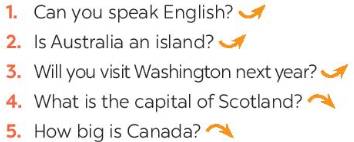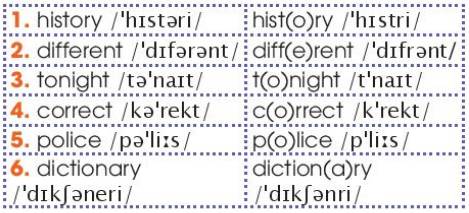Listen and repeat, paying attention to the intonation of the following questions.

Listen and repeat. Pay attention to the falling ( ) or rising (
) or rising ( ) intonation in each of the following questions.
) intonation in each of the following questions.
1. Did anyone go? 
2. Is academic education important nowadays? 
3. What are your plans for the future? 
4. When does the course start? 
Listen and repeat. Pay attention to the falling intonation ( ) and level-rising intonation (
) and level-rising intonation ( ) in the following sentences.
) in the following sentences.
1. Our class is going on a field trip next week  .
.
2. Put your rubbish in the bin! 
3. You can see beautiful caves  , green valleys
, green valleys  and high mountains.
and high mountains. 
Phương pháp giải:
1. Our class is going on a field trip next week.
(Lớp chúng tôi sẽ đi dã ngoại vào tuần tới.)
2. Put your rubbish in the bin!
(Bỏ rác vào thùng!)
3. You can see beautiful caves, green valleys and high mountains.
(Bạn có thể nhìn thấy những hang động tuyệt đẹp, thung lũng xanh và núi cao.)
Listen and repeat. Pay attention to the fall-rise intonation ( ) in the following sentences.
) in the following sentences.
1. Would you like a cup of tea? 
2. Why don‘t you answer your phone? 
3. Would you like me to help you install the soltware? 
4. Can you show me the money-management app you told me about? 
Listen and repeat. Pay attention to the intonation. Practise saying the questions in pairs.
1. Should we focus our campaign on a general social issue  or one affecting mainly teens
or one affecting mainly teens  ?
?
2. Is the top problem facing teens today peer pressure  , body shaming, or bullying
, body shaming, or bullying  ?
?
1. Should we focus our campaign on a general social issue or one affecting mainly teens?
(Chúng ta nên tập trung chiến dịch của mình vào một vấn đề xã hội chung hay một vấn đề ảnh hưởng chủ yếu đến thanh thiếu niên?)
2. Is the top problem facing teens today peer pressure, body shaming, or bullying?
(Vấn đề hàng đầu mà thanh thiếu niên ngày nay phải đối mặt là áp lực từ bạn bè, sự xấu hổ về cơ thể hay bắt nạt?)
a. Listen and repeat, paying attention to the underlined words.
1. The sky today is clear and blue.
2. The speaker talked a lot about honesty.
3. The store on that corner sells local specialities.
b. Choose A, B, C, or D to show the word in each group with a different stress pattern.
1. A. humorous B. tremendous C. numerous D. generous
2. A. national B. animal C. arrival D. typical
3. A. festival B. cultural C. poisonous D. ambitious
1. B
A. humorous /ˈhjuː.mə.rəs/ | B. tremendous /trɪˈmen.dəs/ |
C. numerous /ˈnjuː.mə.rəs/ | D. generous /ˈdʒen.ər.əs/ |
Trọng âm của đáp án D rơi vào âm tiết thứ hai, trọng âm của các đáp án còn lại rơi vào âm tiết thứ nhất.
2. C
A. humorous /ˈhjuː.mə.rəs/ | B. animal /ˈæn.ɪ.məl/ |
C. arrival /əˈraɪ.vəl/ | D. typical /ˈtɪp.ɪ.kəl/ |
Trọng âm của đáp án C rơi vào âm tiết thứ hai, trọng âm của các đáp án còn lại rơi vào âm tiết thứ nhất.
3. D
A. festival /ˈfes.tɪ.vəl/ | B. cultural /ˈkʌl.tʃər.əl/ |
C. poisonous /ˈpɔɪ.zən.əs/ | D. ambitious /æmˈbɪʃ.əs/ |
Trọng âm của đáp án D rơi vào âm tiết thứ hai, trọng âm của các đáp án còn lại rơi vào âm tiết thứ nhất.
Listen and repeat. Pay attention to the elision of the vowels in the words in the second column.

Listen and pay attention to the fall-rise (  ) intonation in the following sentences. Then practise saying them in pairs.
) intonation in the following sentences. Then practise saying them in pairs.
1. Shall we now talk about other learning methods?
2. Could you please pay attention when I’m talking to you?
3. Why don't we use public transport to go to school?
4. Would you like to join our cooking course?
1. Shall we now talk about other learning methods?
(Bây giờ chúng ta sẽ nói về các phương pháp học tập khác chứ?)
2. Could you please pay attention when I’m talking to you?
(Bạn có thể vui lòng chú ý khi tôi nói chuyện với bạn không?)
3. Why don't we use public transport to go to school?
(Tại sao chúng ta không sử dụng phương tiện giao thông công cộng để đi học?)
4. Would you like to join our cooking course?
(Bạn có muốn tham gia Khóa học nấu ăn của chúng tôi không?)
II Read aloud the following sentences, paying attention to intonation.
1. What a beautiful day!
2. What a nice surprise!
3. What a foolish fox it is!
4. What a gorgeous dress she is wearing!
5. How kind-hearted of her to help me!
6. How lazy of him to sleep all the morning!
7. It was very brave of him to fight again the tiger!
8. It was so cruel to kill the rabbit!
B. VOCABULARY AND GRAMMAR
III Choose the odd one out.
1. A. brave B. heroic C. timid D. courageous
2. A. prince B. princes C. engineer D. queen
3. A. fairy B. fox C. glitch D. witch
4. A. kind-hearted B. helpful C. wicked D. merciful
5. A. cruel B. cunning C. evil D. clement
1. A. brave B. heroic C. timid D. courageous
2. A. prince B. princes C. engineer D. queen
3. A. fairy B. fox C. glitch D. witch
4. A. kind-hearted B. helpful C. wicked D. merciful
5. A. cruel B. cunning C. evil D. clement
Mark the letter A, B, C, or D on your answer sheet to indicate the sentence that is closest in meaning to each of the following questions.
The accident happened as a result of the driver’s not paying attention to the road.
A. If the driver would have paid attention to the road, the accident hadn’t happened.
B. Had the driver been paid attention to the road, the accident wouldn’t have happened.
C. If the driver had been paying attention to the road, the accident wouldn’t have happened.
D. Had the accident not happened, the driver would not have had to pay attention to the road.
Đáp án C
Kiến thức: Viết lại câu
Giải thích:
Tạm dịch: Tai nạn xảy ra do lái xe không chú ý đến đường.
A. Sai cấu trúc câu điều kiện loại 3.
B. Nếu người lái xe chú ý đến đường thì tai nạn sẽ không xảy ra.
C. Sai cấu trúc câu điều kiện loại 3, vế giả định dùng thì quá khứ hoàn thành.
D. Nếu tai nạn không xảy ra, người lái xe không phải chú ý đến đường.
Mark the letter A, B, C, or D on your answer sheet to indicate the sentence that is closest in meaning to each of the following questions.
The accident happened as a result of the driver's not paying attention to the road.
A. If the driver would have paid attention to the road, the accident hadn't happened.
B. Had the driver been paid attention to the road, the accident wouldn't have happened.
C. If the driver had been paying attention to the road, the accident wouldn't have happened.
D. Had the accident not happened, the driver would not have had to pay attention to the road.
Đáp án C
Kiến thức về câu điều kiện
Cấu trúc:
- as a result of = because of = owning to = due to = on account of + Ving/cụm danh từ (bởi vì)
- pay attention to: chú ý tới
Tạm dịch: Tai nạn xảy ra do lái xe không chú ý đến đường.
Căn cứ vào “happened” thì câu này phải viết lại bằng câu điều kiện loại 3
Công thức của câu điều kiện loại 3:
If + S + V(quá khứ hoàn thành), S + would/could + have + Vp2
= Had + S + Vp2, S + would/could + have + Vp2
A. Sai cấu trúc câu điều kiện loại 3.
B. Sai vì hành động “pay attention” – chú ý chia bị động
D. Nếu tai nạn không xảy ra, người lái xe không phải chú ý đến đường. (sai về nghĩa)
C. Nếu người lái xe chú ý đến đường thì tai nạn sẽ không xảy ra.